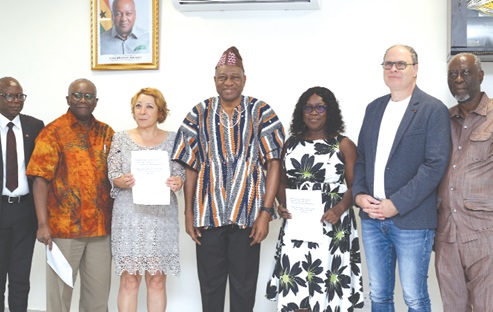The Ministry of Labour, Jobs and Employment has signed a Memorandum of Understanding (MoU) with Dominion Leaders Foundation (DLF), a non-governmental organisation in the education sector, RETOG, and a TVET training institute in Germany, BFW, to provide training and employment opportunities for Ghanaian youth.
Under the arrangement signed in Accra, DLF and RETOG will lead the recruitment process, offer career guidance and provide German language training to candidates aged 18 and above (who could not the German language speak already), preparing them for opportunities abroad.
Once candidates meet the basic requirements and demonstrate language proficiency, they will be referred to BFW to undergo a three-year technical training programme with no tuition fees and monthly stipends ranging from €1,000 in the first year to €1,500 in the third.
After completing the programme, participants will receive full work contracts with the partner companies.
The ministry will support the programme with orientation and policy direction. This collaboration aims to bridge the gap between education and employment by linking youth to structured, paid training and global job placements.
The Minister of Labour, Jobs and Employment, Dr Abdul-Rashid Hassan Pelpuo, signed on behalf of the government, while the Executive Director, DLF, Martha Akoibea Anang; the representative of BFW, Björn Müller; and the Chief Executive Officer (CEO) of RETOG, Reverend Albert Kwabi, signed on behalf of the consortium.
Commitment
Dr Pelpuo reaffirmed the government’s commitment to equipping the youth with industry-relevant skills, describing the partnership as a strategic collaboration aimed at driving skills development, enhancing cooperation, and generating employment in the construction and allied sectors.
He lamented the reliance on foreign labour for technical roles, emphasising the nation’s infrastructural ambitions and need for a skilled local workforce.
He further stressed the need to move beyond traditional education and embrace vocational and technical training as the foundation for national development.
The minister also called for policy reforms to align curricula with market demands, underscoring the ministry’s role in ensuring skills training translates into sustainable jobs.
“Furthermore, this partnership seeks to develop aggressive policy frameworks for job creation. Our role as the Ministry of Labour, Jobs and Employment is to ensure that the skills acquired translate into sustainable livelihoods and contribute meaningfully to our national economy,” he said.
As chairperson of the upcoming Ghana-German Construction Day 2025, Dr Pelpuo pledged to champion cross-sector collaboration, working closely with the Minister of Youth to advance the national development agenda.
He commended the consortium partners for their vision and commitment, expressing confidence that the initiative would yield tangible, long-term benefits for the country.
Rationale
The Executive Director of DLF, Martha Akoibea Anang, who spoke on behalf of the consortium, explained that the rationale behind the agreement was to tackle youth unemployment by bridging the gap between education and practical job readiness.
She said despite heavy government investment in education, many graduates remained unemployed or uninterested in working within their fields, resulting in financial loss to the state.
The MoU, Ms Anang iterated, sought to change this by offering career guidance, skills training, and employment pathways, particularly in collaboration with German partners such as BFW.
She also expressed concern over the absence of Ghanaian beneficiaries in such international programmes, despite interest from countries such as Cameroon, and praised the ministry for facilitating policy support to make Ghanaian participation possible.

